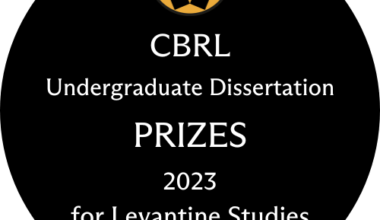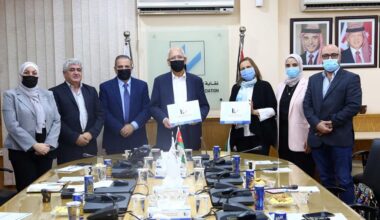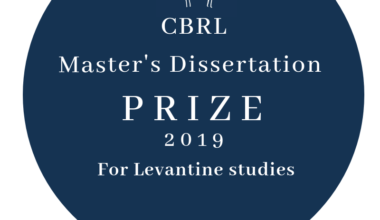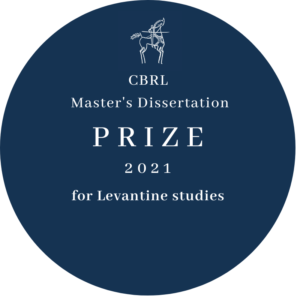
We are delighted to announce the winners of CBRL’s Master’s Dissertation Prizes in 2021
Each year, CBRL invites UK based heads of departments and chairs of departmental examination boards to nominate one final year first-class dissertation in Levantine studies, ancient or contemporary.
The prize evaluating committee, made up of CBRL trustees, commented that the winning dissertations showcased highly original work in scope and were undertaken with an excellent understanding of background or context.
Congratulations to our winners!
Master’s Dissertation Prize 2021 for Contemporary Levantine Studies
Samuel Martin – Joint winner
Dissertation title: Dead Man Laughing: A Typology of Humour and Laughter in Modern Syrian Literature and its Relationship to the Abject. Submitted for the MPhil by Research at University of Cambridge.
“In this essay, I establish a typology of the Syrian literary imaginary based on four archetypes: the alpha male, the victimised woman, the vulnerable child, and the corpse. Authors are unified in their depiction and manipulation of these archetypes to generate humour that performs a specific social function: it destabilises the symbolic order in Syrian political discourse, which has crystallised under the influence of the current regime’s rhetorical practices while laying the groundwork for a reconciliation with the country’s traumatic past and present.
Through the works of modern Syrian literature that spans five decades from 1970 to the present day, including Zakariyya Tamir, Nihad Siris, Rana Haddad, Samar Yazbik, and Khalid Khalifa, I explore how the abject lurks at the edge of narratives and how it produces humorous and disturbing incongruities … a brand of literary humour that is typically Syrian.”

Charlotte Spear – Joint winner
Dissertation title: ‘I have drastically changed while you were reading. And so have you’: Arab Women’s Literature as Transformative Sexual Agency. Submitted for the MA in World Literature at University of Warwick.
“Critical attention to textual registrations of sexuality and sexual violence in Arab women’s literature frequently fall into the same patterns of analysis, focusing on dehumanised, objectifying views of Arab women as violated bodies; victims in need of saving and stuck in a constant position of precarity. This thesis, however, suggests alternative approaches to reading Arab women’s literature that allow us to escape these dehumanising approaches.
In reading Hanan Al-Shaykh’s The Story of Zahra, Darina Al-Joundi’s The Day Nina Simone Stopped Singing, Dunya Mikhail’s The Beekeeper of Sinjar and Joumana Haddad’s The Seamstress’ Daughter, I suggest that we can understand the act of writing as an act of sexual agency, resisting passivity and enacting transformation of the individual subject, cultural subjectivities, and the concept of sexuality itself.”
Master’s Dissertation Prize 2021 for Levantine Archaeology or History
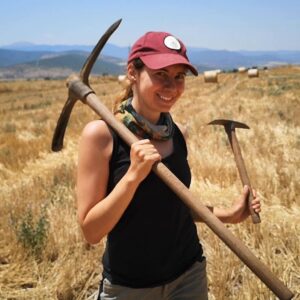
Raven Todd DaSilva
Dissertation Title: Predators in pupils: intersite variability and human/animal linkages of PPNB plastered skulls of the Levant. Submitted for the MA in Archaeology and Heritage of Egypt and the Middle East at UCL.
“Since their initial discovery in the 1950s, the plastered skulls of the Pre-pottery Neolithic B (PPNB) Levant have been subject to multiple, blanketed interpretations, attempting to create one coherent meaning and purpose. While variation between the skulls has been recognised, the possibility of them serving multiple purposes at various sites has not yet been explored. My dissertation investigates this potential by examining the contexts in which the plastered skulls were uncovered, alongside the design variations in eye fabrication and pupil design.
Through my research, I discovered that plastered skulls modelled to have closed eyes were specifically designated to funerary sites. In contrast, skulls modelled to have open eyes were found in more domestic contexts, where they would have been present among living communities. Furthermore, predator-like pupils of eyes may indicate a human-animal linkage, reminiscent of larger ritual sites such as Göbekli Tepe and Nevali Çori that were no longer in use when the skulls were created. This would signify an evolution in traditional ritual practices, translated and adjusted for new sedentary lifeways typical of the PPNB.”













